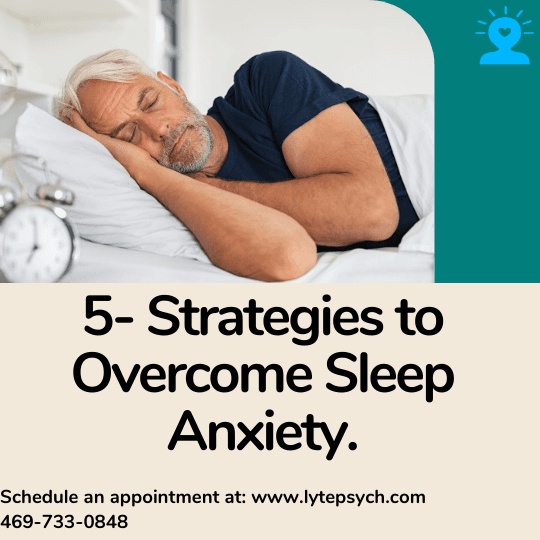Wed May 29 2024
Overcoming Sleep Anxiety: Top 5 Strategies to Restful Night By Lyte Psychiatry Best Psychiatrist Near You (Best Adults and Adolescents Therapist and Psychiatrist) Dallas, Fort Worth, TX

Overcoming Sleep Anxiety: Top 5 Strategies to Restful Night By Lyte Psychiatry Best Psychiatrist Near You (Best Adults and Adolescents Therapist and Psychiatrist)
Sleep is an essential part of our well-being, but for many, achieving a restful night can be a challenge due to sleep anxiety. Sleep anxiety can be caused by various factors, including stress, lifestyle changes, and underlying health issues. However, with the right strategies, it’s possible to overcome this anxiety and enjoy peaceful, rejuvenating sleep. Here are the top 5 strategies recommended by Lyte Psychiatry, the best psychiatrist near you, to combat sleep anxiety.
Understanding Sleep Anxiety
Sleep anxiety refers to the stress and worry that individuals experience when trying to fall asleep or stay asleep. This can lead to a vicious cycle where anxiety worsens sleep, and poor sleep increases anxiety. Understanding the root causes of sleep anxiety is the first step in managing it effectively.
1. Establish a Consistent Sleep Routine
One of the most effective ways to combat sleep anxiety is by establishing a consistent sleep routine. Going to bed and waking up at the same time every day helps regulate your body’s internal clock. Here are some tips to create a routine:
Set a Fixed Bedtime: Choose a bedtime that allows for 7-8 hours of sleep.
Wind Down Before Bed: Engage in calming activities like reading or taking a warm bath.
Limit Screen Time: Avoid screens at least an hour before bed to reduce exposure to blue light, which can interfere with sleep.
2. Create a Sleep-Inducing Environment
Comfortable Bedding: Invest in a comfortable mattress and pillows.
Room Temperature: Keep your bedroom cool, ideally between 60-67°F (15-19°C).
Darkness and Quiet: Use blackout curtains and earplugs or white noise machines to minimize disturbances.
3. Practice Relaxation Techniques
Deep Breathing: Practice deep breathing exercises to slow your heart rate and relax your muscles.
Progressive Muscle Relaxation: Tense and then slowly release each muscle group.
Meditation and Mindfulness: Engage in meditation or mindfulness exercises to reduce stress and promote relaxation.
4. Limit Stimulants and Alcohol
Caffeine: Avoid caffeine in the afternoon and evening as it can stay in your system for several hours.
Nicotine: Nicotine is a stimulant that can interfere with sleep. Try to avoid smoking close to bedtime.
Alcohol: While alcohol may help you fall asleep initially, it can disrupt your sleep cycle later in the night.
5. Seek Professional Help at Lyte Psychiatry ( Best Therapist and Psychiatrist Near You)
If sleep anxiety persists despite trying various strategies, it may be time to seek professional help. A psychiatrist or sleep specialist can provide valuable insights and treatments tailored to your needs. At Lyte Psychiatry, our experts are dedicated to helping you achieve restful sleep through personalized care.
Cognitive Behavioral Therapy for Insomnia (CBT-I): This therapy addresses the thoughts and behaviors that prevent you from sleeping well.
Medication: In some cases, medication may be prescribed to help manage anxiety and improve sleep.
To Schedule an appointment. Click Here
To see our services. Click Here
Call us if you have questions at 469-733-0848
FAQs
Q: What is sleep anxiety?
A: Sleep anxiety is the fear and worry associated with falling asleep or staying asleep, which can lead to chronic insomnia and other sleep disorders.
Q: Can establishing a routine help with sleep anxiety?
A: Yes, a consistent sleep routine helps regulate your body’s internal clock, making it easier to fall asleep and stay asleep.
Q: Are there specific foods or drinks that can help reduce sleep anxiety?
A: Certain foods and drinks, like chamomile tea and foods rich in magnesium, can promote relaxation and improve sleep quality.
Q: How long does it take for relaxation techniques to work?
A: The effectiveness of relaxation techniques varies, but with regular practice, many people notice improvements within a few weeks.
Q: When should I seek professional help for sleep anxiety?
A: If sleep anxiety significantly impacts your daily life and persists despite self-help strategies, it’s advisable to seek professional help.
Q: Can medication cure sleep anxiety?
A: Medication can help manage symptoms of sleep anxiety, but it’s often most effective when combined with other treatments like therapy and lifestyle changes.